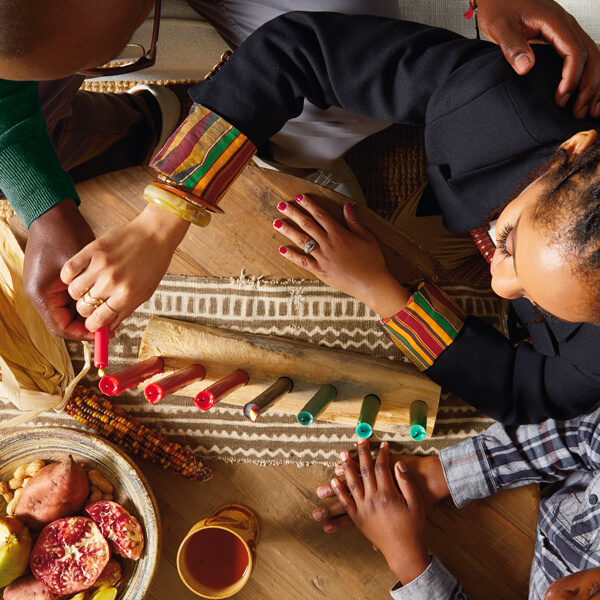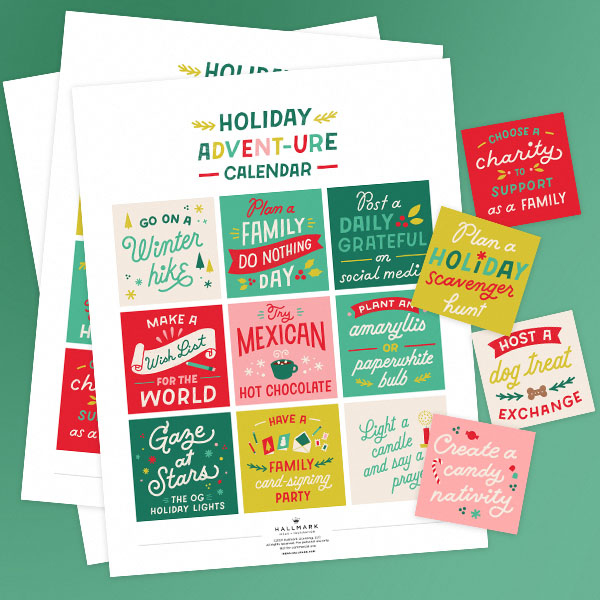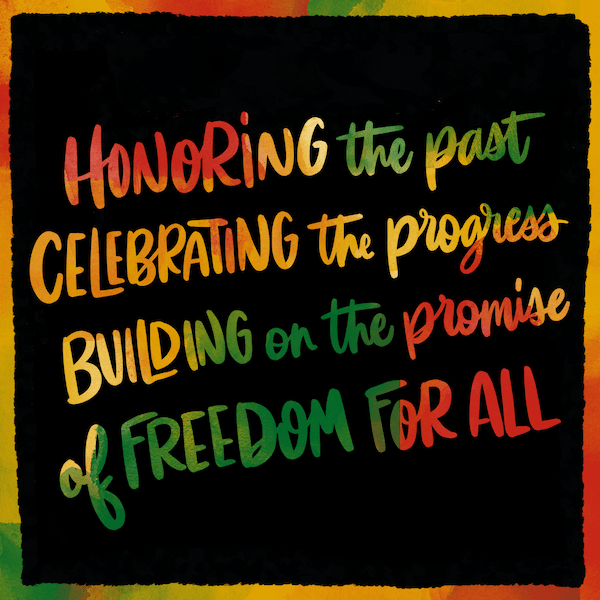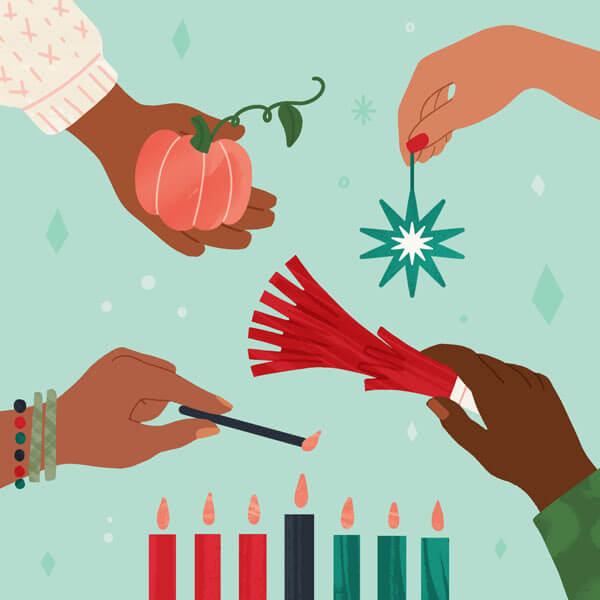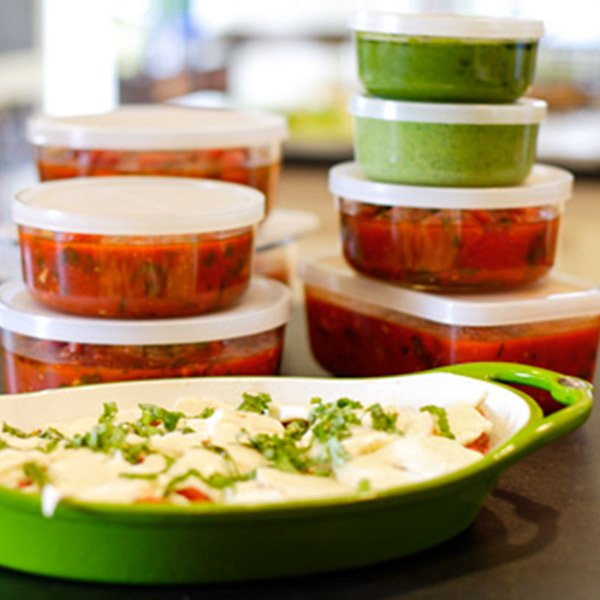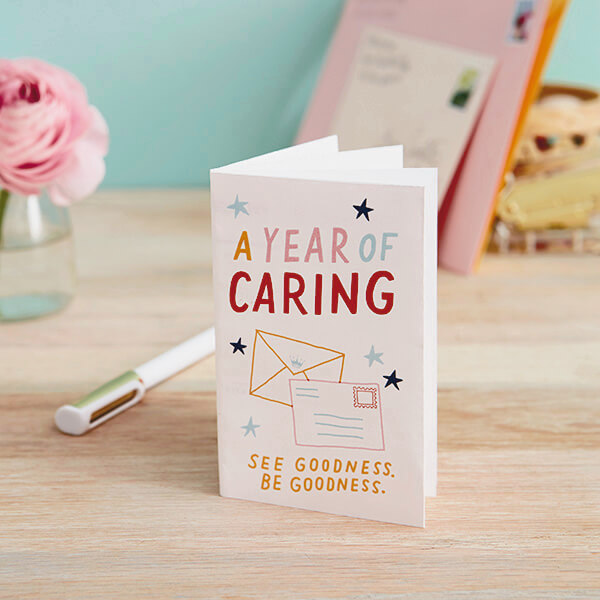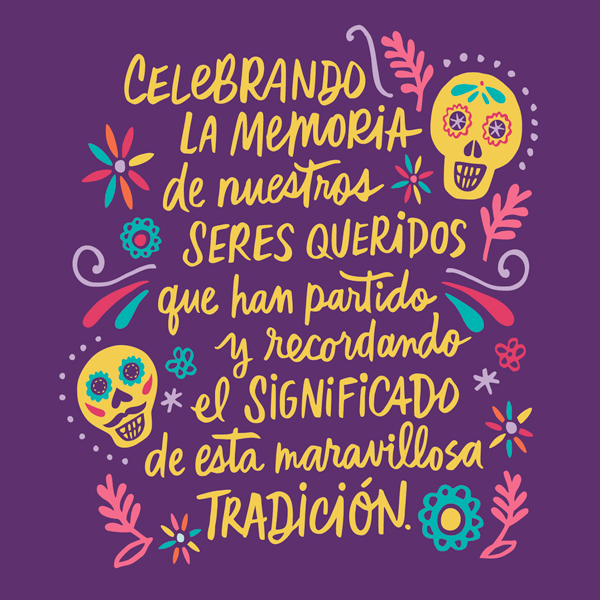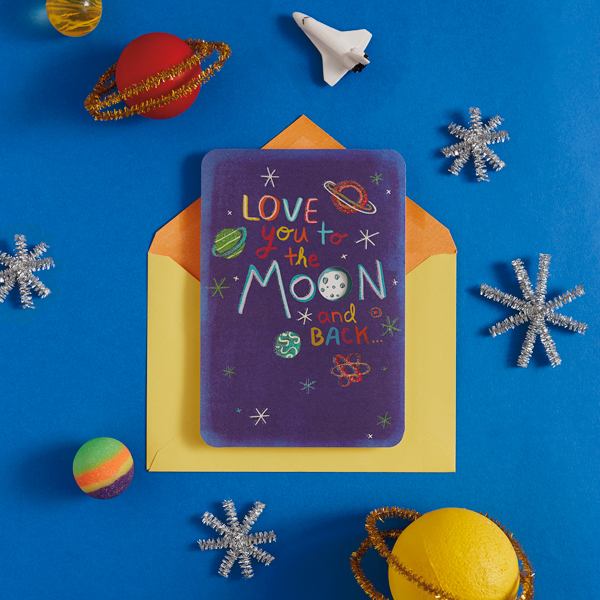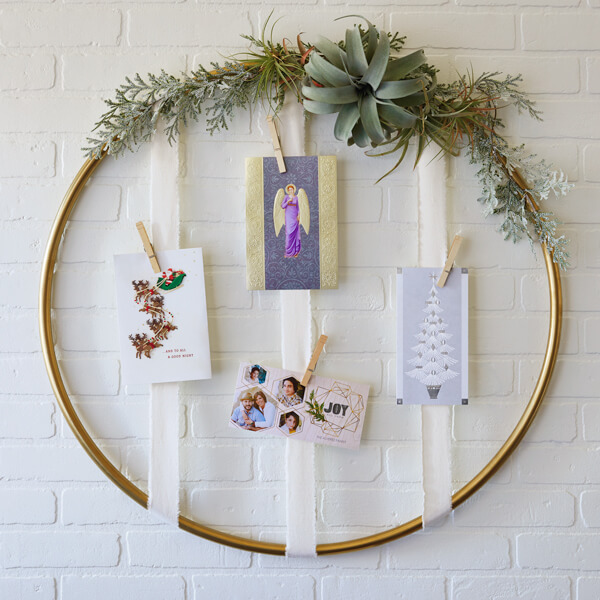Interfaith holiday celebrations and traditions
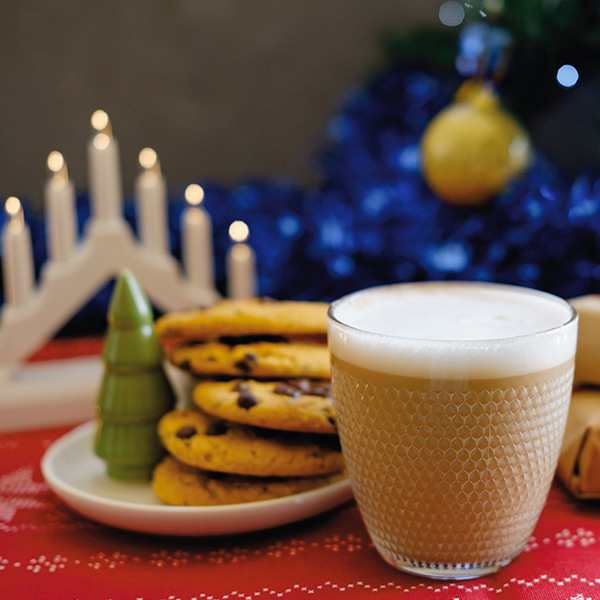
The traditions we grow up with often shape our holiday celebrations. So what happens when people of different faiths become one family? We asked friends about the ways they’ve blended and shared their interfaith holiday celebrations, from decorating to gift-giving to gathering around the table.
For this post, Hallmark writers Kevin Dilmore and Keely Chace spoke with friends and family to learn about their favorite holiday traditions.
Inspired? Create and share by tagging @HallmarkStores.
Blending families from different faiths
The “holiday season” is about more than the Christian celebration of Christmas and the Jewish celebration of Hanukkah. Muslims, Buddhists, Pagans and others observe religious holidays during this time as well. Couples who come from different faith backgrounds find ways to blend their customs and create their families’ own unique traditions.
Diana S. (Christian with a Jewish spouse)
My husband was adopted, and recently through genetic testing, he found out about his birth mother’s family. They embraced him and our family beyond our wildest dreams.
It was such a privilege and honor to be asked to partake in their Seder. They reflected on the past but looked to the future. It reminded me of my childhood Thanksgivings with a house crammed full of relatives and a feast to devour, but with the added joy of singing songs.
Sergio M. (Buddhist with a Christian spouse)
I love holidays. I love all of the holidays. If we get invited to a Passover Seder, I want the kids to go. I’m not Jewish. When we get invited to Ramadan dinner to break the fast, I want them to experience that. If we get invited to a Lunar New Year celebration or whatever, that is important to me and I want to celebrate that.
With that same curiosity, I want to do Easter, too, and I want to do Santa Claus and Jesus and everything.
Mary Lynn I.
I grew up for many years in Indonesia, where my parents served as missionaries. It’s a country that acknowledges several major religions, and there’s a very open and accepting attitude toward different faiths. Around the holidays, friends go around visiting each other, whether they are Muslim, Christian, Hindu or something else. My mom would always make her Swedish tea rings to bring when we’d visit, so we were able to share a little piece of our traditions, too.
Laurie U.
My husband is a Christian, the kind who contemplates Jesus and plays in the band at his church. But he married me, an atheist Jew. When it comes to Christmas, we are 100 percent on the same page: We both love it.
We put lights up outside the house and go crazy on Christmas Day, with a bagel brunch as a nod to my own culture. On Hanukkah, we light the menorah—the same one I had growing up.
Gathering around a bigger table
Who’s hungry? From multicourse meals to a spread of sweet snacks, food is the fuel that keeps a holiday gathering going. As a family blends and grows, so will the recipes and cuisines represented on a big occasion.
Diana S. (Christian with a Jewish spouse)
Hanukkah is latkes (potato pancakes) and chocolate egg creams. Christmas Eve is cookies and eggnog. Christmas morning is waffles. Passover is matzo ball soup and items from a Seder, such as charoset (apples and walnuts).
Melody E. (Jewish with a Christian spouse)
Every year on Christmas Eve we go to his granny’s house along with the whole, huge, extended Catholic family. His aunts always bring beautifully decorated sugar cookies.
When I married in, they started bringing a few Hanukkah cookies every year as well, intricately decorated Stars of David and menorahs. They’re always the first cookies to go—everybody wants them. Ironically, my tradition is now bringing little strawberry Santas to Christmas Eve.
Mary Lynn I.
There’s a very “open table” kind of spirit when my family and I get together with Indonesian friends at the holidays. We invite everyone to our Christmas party, and they invite us to their Eid or New Year celebrations.
Usually, we’re all craving Indonesian food, and we’ll put together a potluck. Our friends are a mix of Muslim, Christian and other faiths, so one thing we do is label dishes as a courtesy to anyone who adheres to a halal or kosher diet. This also makes it no big deal to label food containing potential allergens—or extra spicy dishes. Indonesian food can be pretty hot!
Ideas for holiday menus:
- Poll the family on specific dishes or snacks they associate with the holidays. If the list gets too long or complex for the host to make, ask guests them to bring their favorites to the party.
- Don’t stress out trying to get Grandma’s recipe just right. Everyone will appreciate the effort even if it doesn’t taste exactly the same.
- When in doubt, start something fun that might just become a part of your annual celebrations. Santa pizza, anyone?
Sharing space on the tree
Well-adorned trees and evergreen garlands symbolize the holiday season for many people. This centuries-old tradition is associated these days with Christmas but originated in a number of cultures. How they are adorned is where the fun begins.
Melody E. (Jewish with a Christian spouse)
We decorate in a “Chrismukkah” style. We put up a Christmas tree every year with a mix of Hallmark Keepsake Ornaments, including the annual Jewish ornament. Our other ornaments are blue and white and live alongside ornaments from when my husband was little—and, of course, all of the “Star Wars” ships. On the mantle are strings of dreidel lights, fancy menorahs, stockings and Christmas trees all living side by side.
Christopher P. (Christian with a Jewish spouse)
We are a mix of nonpracticing religious families, but we still do a tree and stockings, often including Hanukkah gelt, and we do a menorah. We kind of take what we consider some of the best of both to make it our own. And because we think it is cool, as a tree topper, we have a large Mothra toy, because what holiday can’t use a kaiju (giant monster)?
Diana S. (Christian with a Jewish spouse)
I’m particularly happy about the recent Jewish representations created for Christmas trees. I’m an avid ornament collector and put up a lot of Christmas trees. It made me sad that I didn’t have a lot to decorate for Jewish holidays. Now I have some lovely porcelain pieces.
Tips for mixing decorations:
- Incorporate holiday decor that reflects the blending of your family’s traditions. There’s no wrong way to decorate as long as it feels fun and respectful of what’s important to each of you.
- If mixing decor doesn’t suit your family or if you feel more comfortable celebrating each tradition in its own way, create a separate space or room to devote to each.
Respecting others’ faith traditions
Whether a small gesture or a grand ritual, the details we add to celebrations carry great personal meaning. Making an effort to include and honor a variety of traditions at the holidays is a sure way for family and friends to feel loved and welcomed.
Mary Lynn I.
When I order Christmas photo cards, I always order some that say “Happy Holidays” or “Happy New Year” for friends who don’t celebrate Christmas. I don’t want to leave them out of our family’s holiday wishes, and it’s an easy thing for me to do to include them.
Catherine H. (Christian with a Christian spouse)
As a mom in a blended family of six, I find myself mixing and matching holiday traditions all of the time. When we find that our traditions are at odds with each other, we find a work-around. Sometimes that means doing all of the things and spreading them out over several days, so that every kid feels like their own traditions are represented. And sometimes, you just have to let things go—but thankfully, starting brand-new traditions is exciting, too!
Dan T. (Christian with a Christian spouse)
When we pray before a Thanksgiving or Christmas meal, I try to do it with a focus on the people and the fellowship we share, and not the language or even the form of a more traditional, “churchy” delivery. We’ve got “married in” from theologically very liberal to very conservative, so it’s a more inclusive way to do it.
Rich H. (raised in a Christian and Jewish home)
My immediate family now consists of Jews, Catholics, Methodists, former Christian Scientists, atheists and more—and my mother became a Buddhist later in life, while retaining her Jewish traditions in order to honor her parents. It’s a crazy but amazing situation, and our Christmases and Easters are all the better for it. Ours isn’t so much a family tree as it is a family orchard, but we all consider each other family, no matter what faith or family branch we stemmed from.
Ways to include others:
- Each of us has that one thing that makes a holiday feel complete. Find out what that is for people you love.
- Talk to family members and holiday guests about their celebrations and what they find meaningful. Sharing stories is a great way to feel closer.
- Here are more tips for being mindful of others’ faith traditions.
Including kids in interfaith celebrations
Little giggles and big hugs make any holiday happier—so bring on the kiddos! Blended families do great with mixing and matching traditions in ways that maximize the fun—and the meaning—for their youngest members.
John O. (Jewish with a Jewish spouse)
Despite being Jewish, I was raised with the whole Christmas shebang, of which my favorite part was the morning stocking of small gifts.
I had no problem switching to Hanukkah when I married a Jewish woman who felt strongly about the Jewish traditions and definitely did not want our son growing up with a Christmas stocking. We talked about it and compromised on him getting his eight Hanukkah gifts—one per night—in a cookie jar that he gets to open and discover “stocking stuffers” inside.
Grace P. (Wiccan with a Christian spouse)
The way we do things is simple: We respect each other, so we support each other. I was happy to have our daughter attend a Lutheran church and even become baptized. Her spiritual journey is hers alone. We’re currently teaching her about all religions, not just the ones that resonate with us.
Rich H. (raised in a Christian and Jewish home)
At Easter, we left out carrots for the Easter Bunny and matzo for the Passover Duck, which was something my family made up so that the Easter Bunny would have a Jewish counterpart—kind of like Hanukkah Harry on “Saturday Night Live.”
Natalie F. (Christian with a Jewish spouse)
The Hanukkah gifts go under the Christmas tree. Then, Santa comes on Christmas Eve and brings more gifts. The kids are too young to go into theology, but when they are older and realize that Santa isn’t real, we will tell them that sometimes adults like to play pretend just as much as kids. Right now, these things are working for us, but with every life stage, something is going to change. So what works today may or may not work next year.
Emily A. (Christian with a Buddhist spouse)
We like acknowledging Christmas and Easter, although we’re not going as deep into the spiritual background of those traditions. I don’t think it was until my husband became a Buddhist that we started thinking more strategically about how it is we want our kids to have an understanding of different religions and a cultural religious literacy of some sort.
We’re not expecting them to know everything about everything, but to be as familiar with Buddha as they are with Jesus or God—and know those aren’t the only two.
Sergio M. (Buddhist with a Christian spouse)
There are a bunch of Buddhist holidays that I honor and participate in. But I’m not raising Buddhists. I’m raising children. What we want them to know is that there are a lot of different ways that people find meaning and celebrate milestones.
Shop Religious Gifts
See allYou may also like
See more-
Christmas Sweet dreams, Santa!
Catch Santa napping on the job with this Snoring Santa Keepsake Ornament featuring sound and motion. With every snore...
-
Kwanzaa What is Kwanzaa?
What is Kwanzaa? A festival of lights rich in African symbolism, it takes place each year from December 26th through ...
-
Christmas Advent calendar activities for adventurous families
It’s time to start the countdown. Maybe it’s about being mindful…or counting your blessings…or preempting your kids a...
-
Summer Ways to celebrate Juneteenth
While Juneteenth was officially recognized as a federal holiday in 2021, this pivotal moment in history has been cele...
-
Christmas Christmas and Kwanzaa: Keeping family holiday traditions and finding your own
Whether you’re single or starting a family, religious or agnostic, someone who celebrates Christmas and Kwanzaa or ju...
-
Halloween Make ghosts and goblins feel right at home this Halloween
Light up your home with haunting Halloween seasonal decor. 🎃👻 Shop now at Hallmark Gold Crown stores or at Hallmark.com.
-
Halloween No scaredy cats around here!
When this black cat crosses your path, you know fun can't be far behind. 😻 🧙♀️ Shop the Zip-A-Long Cat in Hallmark G...
-
Halloween While you’re waiting for The Great Pumpkin this Halloween…
Fly around the pumpkin patch with Zip-a-long Snoopy! 🎃 Shop more frightening finds in Hallmark Gold Crown stores and ...
-
Halloween Light up the night with frightful fun!
Could it be? Could it be!? Yes it is! It’s the Peanuts® Snoopy and Woodstock Halloween figurine! 🎃 🐶 Find it and more...
-
Halloween Where cozy meets mischief and magic
Make some magic this Halloween with this Hocus Pocus hooded blanket. 🧙♀️👻Find more Halloween essentials in Hallmark ...
-
Gifting Relive a favorite from your childhood!
Fill your home with a few small joys inspired by Disney’s “It’s a Small World” 🩵🎎 Shop the collection at Hallmark Gol...
-
Halloween Which house will you be sorted into?
The Harry Potter™ Sorting Hat™ Mug plays sound whenever you lift the lid. Find this chatty mug in Hallmark Gold Crown...
-
Encouragement How to support caregivers
It’s often hard to know how to support a caregiver. Most caregiving checklists out there hit the major topics like me...
-
Love 50 different ways to say I love you
You don’t need to wait for a special occasion to remind that certain someone how much he or she is loved. Spice up yo...
-
Graduation 15 graduation quotes
Celebrate your favorite grad’s milestone with the wit and wisdom of Hallmark writers, fans and others. We’ve rounded ...
-
Congratulations How to congratulate someone
Congratulating others is easy and fun, right? Like when your friend worked really hard and got that awesome job makin...
-
Care & Concern Be more caring with a kindness journal
It's obvious the world could use more kindness. So this year, why not make "be more caring" your number one resolutio...
-
Fall Día de Muertos: A celebration of life and love
Día de Muertos, Day of the Dead, is a holiday originally celebrated in the southern and central parts of Mexico and i...
-
Card Ideas Card messages for kids: What to write in a kid’s holiday card and more
My 3-year-old was having a hard time at preschool drop-off. Dragging his feet. Asking to stay home. This went on a fe...
-
Christmas 6 Creative Christmas Card Display Ideas
Holiday card season is here: Our mailboxes are about to fill up with festive envelopes with pretty stamps and familia...


